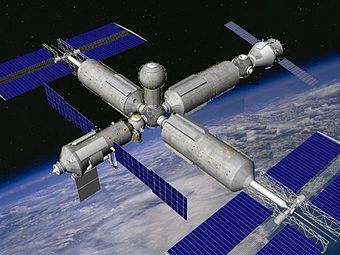- Orbital Piloted Assembly and Experiment Complex
-
The Orbital Piloted Assembly and Experiment Complex (Orbitalniy Pilotiruemyi Eksperimentalniy Kompleks[1]) (OPSEK) is the planned Russian successor to the International Space Station, with the main goal of supporting deep space exploration.[2]
Contents
Overview
Before the predicted decommissioning of the International Space Station in the late 2010's to 2020's, the Russian Federal Space Agency (Roskosmos) plans to detach some of its modules, such as the Multipurpose Laboratory Module (to be launched to the ISS in 2012), and use them as the basis for a new space station.[3] The main purpose of OPSEK would be to support eventual manned Mars missions. All the main components of such a Mars expedition would first dock at the station, before leaving for Mars. As a secondary role, the station would also support lunar expeditions.[3]
On 17 June 2009, Roskosmos officially informed its ISS partner, the United States, about its intention to "build and prepare for operation the first elements of the orbital assembly and experimental piloted space complex by the end of the ISS life cycle."[3]
According to the Russian manned spaceflight contractor RKK Energia, the new station must be able to perform the following tasks:[4]
- Large spacecraft assembly
- Flight tests and launches
- Creating, servicing and completing inter-orbital tugs
- Providing medical and biological conditions required for the rehabilitation of inter-planetary expedition crews after their return to Earth orbit.
Modules
Expected Russian Orbital Segment modules around the time of OPSEK separation (2015/2020) arranged by launch dates:
- 1998, Zarya (FGB-1) - owned by NASA, could be traded for Soyuz/Progress flights in the 2013[5]-2015/2020 timeframe
- 2012, Nauka (FGB-2) - to form part of OPSEK[citation needed]
- 2013, Nodal Module (if approved) - to form part of OPSEK[citation needed]
- 2014, Science-Power Module-1 (if approved) - to form part of OPSEK[citation needed]
- 2015, Science-Power Module-2 (if approved) - to form part of OPSEK[citation needed]
See also
- Russian Orbital Segment
Preceded by
Russian Orbital SegmentOrbital Piloted Assembly and Experiment Complex
2015/2020 -Succeeded by References
- ^ http://www.russianspaceweb.com/opsek.html
- ^ "Russia 'to save its ISS modules'". BBC News. 2009-05-22. http://news.bbc.co.uk/2/hi/science/nature/8064060.stm. Retrieved 2009-07-04.
- ^ a b c Zak, Anataloy (2009-07-03). "Orbital Piloted Assembly and Experiment Complex". Russianspaceweb.com. http://www.russianspaceweb.com/opsek.html. Retrieved 2009-07-04.
- ^ "Russia could build orbital assembly complex after 2020 - Energiacorporation". Interfax. 2009-08-18. http://www.webcitation.org/5j8D34fZx. Retrieved 2009-08-18.
- ^ NASA signs contract for Soyuz seats up to 2013.
External links
- Great Images in NASA library
- International Space Station: Station Structure
- OPSEK information page
- Presentation, by Head of Russian Federal Space Agency, June 17, 2009
Space stations and habitats Active Defunct Soviet Union
and RussiaUnited StatesCancelled ISS-incorporated Developmental ChinaSpace Complex Alpha · Space Complex BravoRussiaOPSEK · LOSProposed Rotating wheel · Bernal sphere · O'Neill cylinder · Stanford torus · Wet workshop · Space habitat · Industrial Space Facility · Orbital Technologies Commercial Space Station1 Never inhabited 2 Failed launch 3 Part of the Almaz military program Categories:- Russian space program
- International Space Station
Wikimedia Foundation. 2010.

